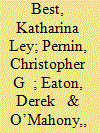| Srl | Item |
| 1 |
ID:
166588


|
|
|
|
|
| Summary/Abstract |
This article examines the evolution of the current British military joint intelligence doctrine. We argue that military intelligence doctrine is dogged by an intrinsic tension between the ethos and expectations of military doctrine and those of the professional practice of intelligence. We further argue not only that prior iterations of UK joint intelligence doctrine failed to effectively deal with this intelligence doctrine dilemma, but also that measures in the current doctrine to address this problem directly created their own problems. Moreover, as a result, otherwise sound innovations in the current UK intelligence doctrine have proven unsuitable to wider diffusion in more recent intelligence doctrine such as the new NATO intelligence doctrine which, otherwise, draws extensively on its British precursor.
|
|
|
|
|
|
|
|
|
|
|
|
|
|
|
|
| 2 |
ID:
167174


|
|
|
|
|
| Summary/Abstract |
This essay outlines a theory of land power. After explaining the absence of such a theory, the article establishes the modern context for such a theory, specifically within the concept of joint interdependence. The analysis defines key terms and premises behind the theory, to include a definition of land power. The argument then outlines the national elements of power that contribute to a theory of land power. The analysis next applies the theory to the fundamental purposes of military power: defeat, deter, compel, assure, shape and support to the nation. The analysis then tests key definitions, supporting premises, and utility of the theory. The essay argues that historical experience validates the applicability and utility of the theory, and offers a solid basis for extrapolating the validity of the theory into the near future.
|
|
|
|
|
|
|
|
|
|
|
|
|
|
|
|
| 3 |
ID:
154703


|
|
|
|
|
| Summary/Abstract |
US national security guidance, as well as the US Army’s operational experiences since 2001, emphasizes the importance of working closely with partner countries to achieve US strategic objectives. The US Army has introduced the global landpower network (GLN) concept as a means to integrate, sustain and advance the Army’s considerable ongoing efforts to meet US national security guidance. This study develops the GLN concept further, and addresses three questions. What benefits can the GLN provide the Army? What are the essential components of the GLN? What options exist for implementing the GLN concept? By developing the GLN concept, the Army has the opportunity to transition the GLN from an often ad hoc and reactive set of relationships to one that the Army more self-consciously prioritizes and leverages as a resource to meet US strategic objectives.
|
|
|
|
|
|
|
|
|
|
|
|
|
|
|
|